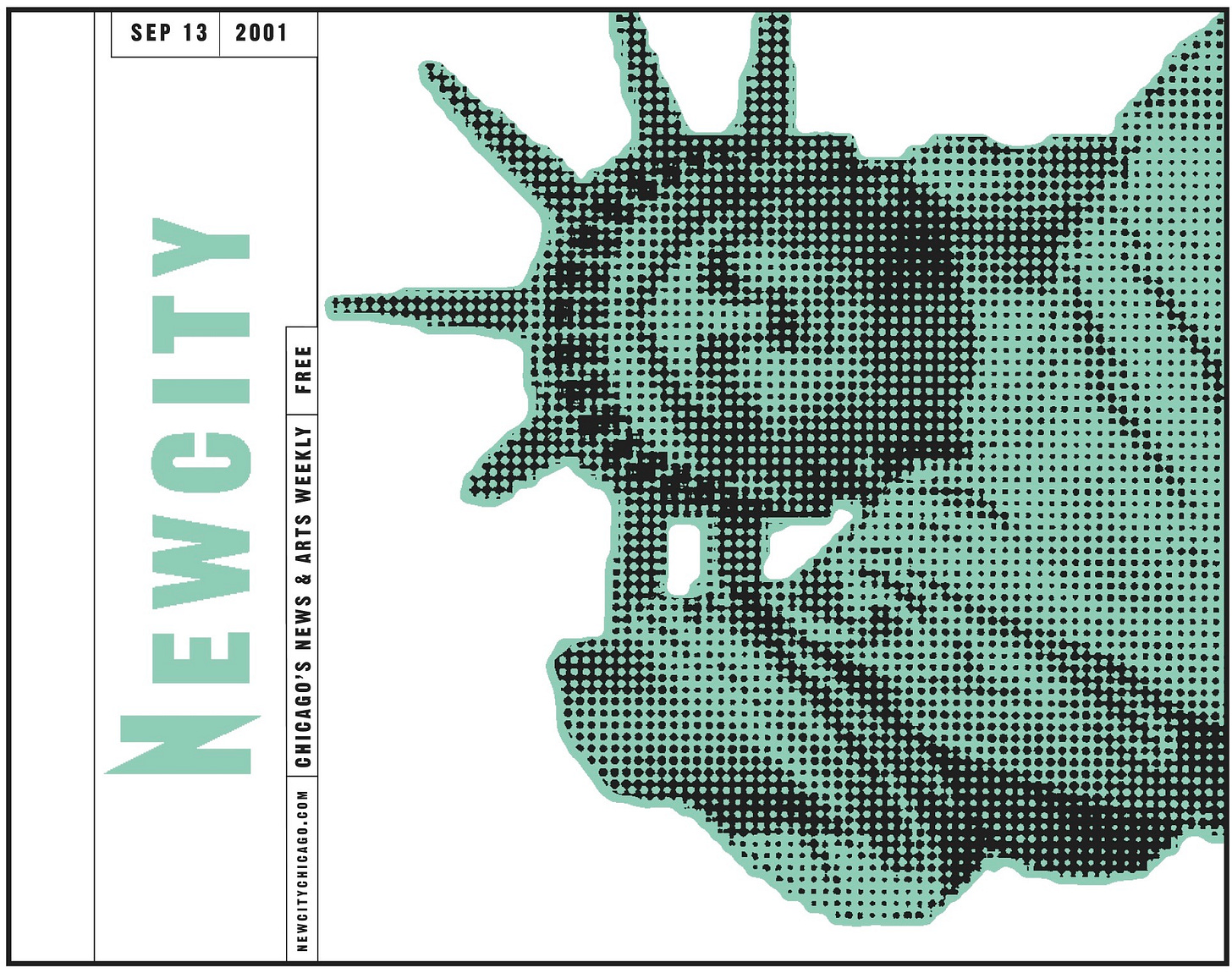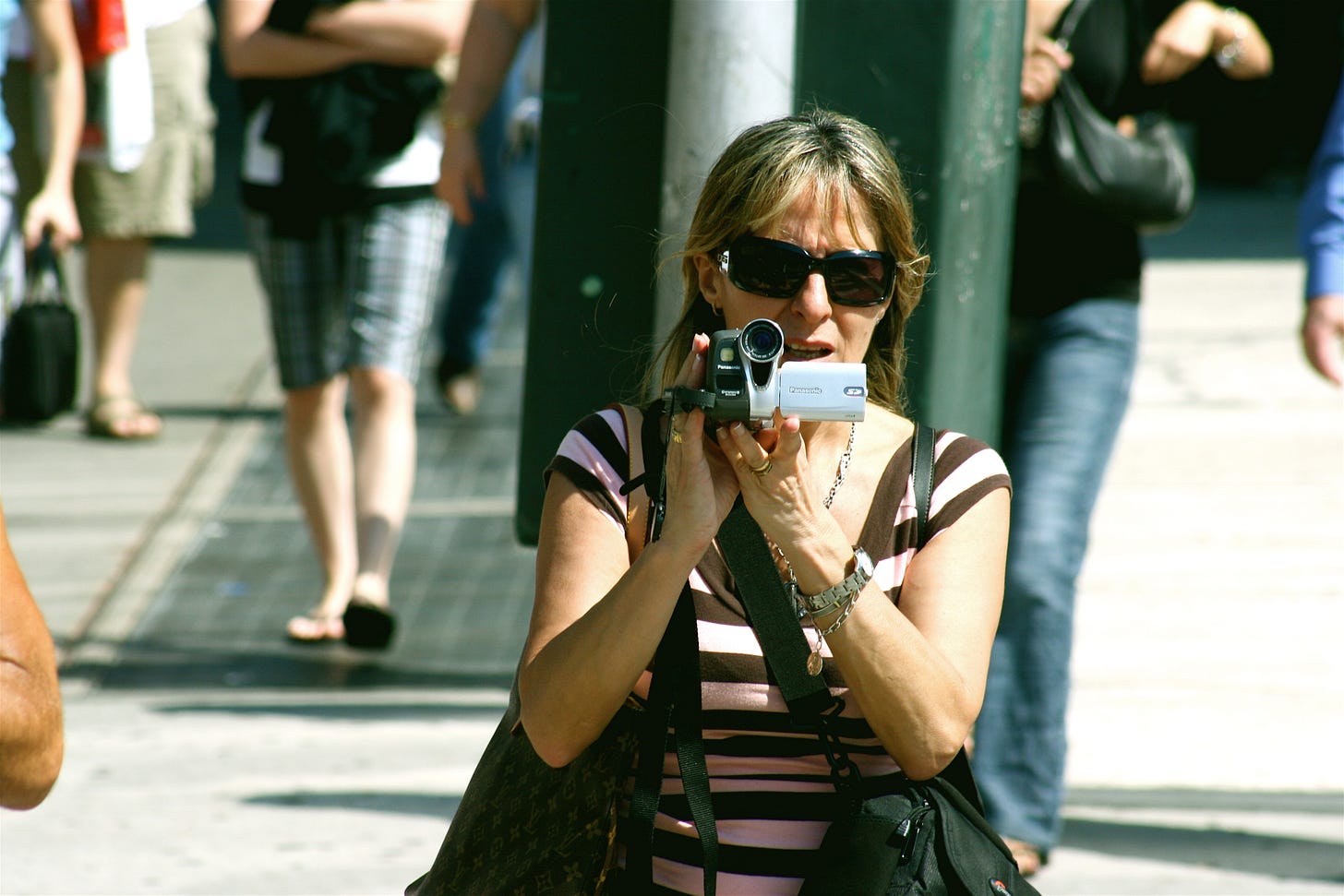SEPTEMBER 11, 2001, 11:12am Eastern Time
By Ray Pride
Pure joy, pure bliss: I saw a movie called Amelie on Monday night that may make my fictional year.
Little tears sting my eyes throughout. I join friends from New York at a party for a film set in Los Angeles. We talk about what we have seen. I think of questions to ask the director of Amelie today.
I sleep on it. I wake a little after 10 on Tuesday to the words of my roommate at the Toronto International Film Festival. I’m supposed to interview David Lynch in a couple of hours, talk about the psychological mayhem of Mulholland Drive, a movie of glittering absurdity.
But CNN is on in the living room. My colleague, Steve, and I watch the footage from New York. We’re kibitzing in a void, not really listening to each other, just commenting and theorizing so gravity does not pin us to the ground. Toronto local lines work, I can get online. Cell phone, forget about it. I have to assume my friends are fine. None of them live or work near the World Trade Center.
Steve and I watch the footage, ash-covered emergency vehicles slaloming between pedestrians, spilled into the street, faces mostly blank, some bloodied, all urgently getting away: from danger, from cameras, from mad fact.
The philosopher George Steiner has a new book out, “Grammars of Creation.” He continues his argument of many years that language is no longer possible, and has not been in the time that has spun out since the Holocaust. I can’t follow all his reasoning. But fiction I am concerned about today. Yesterday, audiences were shaken by Tim Blake Nelson’s Holocaust narrative, The Grey Zone. I decided to wait. I wanted joy, not gloom. Distraction, craft, the diversion of art: not the diversion of tragedy to fiction.
I blow off two morning screenings. The best movies at this year’s Toronto festival have been about happiness, the search for truth, the search for simple beauty. Jill Sprecher’s fine Thirteen Conversations About One Thing is one of the best of that bunch. But all conversations today will be about One Thing that does not involve Love or Happiness or things that we want to see in capital letters, such as America Under Siege.
Will David Lynch still want to talk? Will Jean-Pierre Jeunet still want to discuss the notion of onscreen happiness and bliss later this afternoon?
Online for only seconds, my AOL Buddy List lights up with names: New Yorkers who are safe, for now, in their own homes, describing the din of voices and vehicles outside, the idea there is nowhere to go. A journalist I know was on her way to get passerby reactions after the first plane hit the World Trade Center. She forgot her police pass. She went back home. The second airliner hit. She is staring at the TV, ready to collect “local color.” But stays online. But stays indoors. “I’m fucked up,” she says, the deadpan of typed words as ashen as the faces on CNN.
Others ask me to pass messages along to friends at the festival. Mike saw the first explosion from his kitchen window across the river. Andrew is okay. Tell Scott’s friends the Bowery still stands.
Canadian television throws to its own commentators. “We go now to a sociology professor from Grimsby.”
Grim. Grimm’s fairytales: they’re just stories that go bump in the night. But who wants to go into the dark today? Movies, movie archetypes, they all seem unworthy at the moment. I don’t want to find myself at a great movie, I won’t be able to concentrate. I don’t want to fall into a crap movie like the Steve Martin dud, Novocaine, because life is just too short. Even the Bosnian war black comedy, No Man’s Land, is inappropriate. I want to watch the images on the smaller screen, like I did during the L.A. riots. However shabby the analysis, however unclear the activity, however shaky the camera, this urban topography, the New York I know and love, is familiar. The fear on the faces is not. Can narrative contain chaos? A little girl is the only one who remembers to cry. Her mother wipes ash from her ruby cheeks with bottled water.
“I’m as close as I can get without being shooed away,” someone says on a cell phone to the Canadian equivalent of CNN.
It’s all too true to be good. Back on the real CNN, commentators invoke Tom Clancy. They wonder where the president is. Pulp fiction is their touchstone. Steve and I mention names like George Romero, watching the shots of the streets of Manhattan where no one walks, only runs, only gallops. We start to compare the events to other apocalyptic fictions, but stop suddenly, a silent compact: let’s talk about family, friends, what will become of civil liberties in the United States.
I may be in Canada a long time. I wonder what country I’ll be returning to.
31 January 2002
NEW YORK STATE OF MIND
Moving about in post-aftermath New York
THE PLANE BANKS to the right, toward Brooklyn.
The last time I flew into New York, the 767 rode low over the lights of Manhattan, as if tugged gently along the beaded arterial glow of Broadway. It's a sooty dusk this December day, not from smoke, but from fog and shattered light. It is as if this spectacle were composed of albumen and platinum and memory, like a Stieglitz print on a clean, well-lighted gallery's wall.
Of course I look for the absence. I know New York. But not so well that my eye intuitively knows how to sketch in the missing towers. I cannot see coils of smoke, only sprigs of rain and approaching night.
The weather is unseasonable, warm, then hot, the renewal of spring in blizzard season. I am staying further uptown, where flowers are confused, in early bloom, their enthusiasm sentencing them to certain death. The next day, the light on the streets is as clear and bright as a new lover's smile. And it smells of spring. I go downtown to a friend's, nearer the site, and I expect the unspeakable buzzsaw of smells to assault my senses. The burning Coke cans, as some said, the bristle of burning wire, copy toner, frizz. But no. The night's damp still lingers in sidewalk crevices, along the facades of bodegas and bars and boutiques. At Houston and Bowery, I know I will go no closer. I have read, seen, talked, e-mailed, considered: I do not wish to know the literal void. The spiritual void is being filled. Colleagues and friends talk of renewal, not thematically, not dogmatically, but through simple enthusiasm, mere hope. The next day will mark two months since September 11. We don't talk around the subject, but no one really wants to talk about it. It is not a dance around the 220-story elephant in the room, but a dance of celebration, to the gift of inappropriate, untimely atmospheric conditions, a shred of global warming caressing the hearts, bodies, faces of the recently battered.
At Cafe Gitane, the smell of brioche, café au lait, and that glorious attitude: I deign to serve you, how dare you look at me, enjoy your small parcel of land on this little sidewalk in so-large Soho. The sun beams down. We talk of many things, and all are good. The light of beautiful eyes, obscured first by sunglasses, but then by smiles that beam almost like phosphorus. We are alive; Manhattan is happy; we persist, we will grow stronger; soon, we will even be surly again. One of the waitstaff stands on the lip of the doorway, looks toward the sun. "It smells like France," she says.
"What part," I ask, "Are you from there?
"I'm from Morocco," she says, "I just imagine it smells like France."
"What does Morocco smell like?"
"The sun." She squints, then cuts me a smile like fresh creamery butter.
I'm invited to a dinner party that night. A documentary is premiering on the Sundance Channel. The filmmaker has invited friends and peers to share her debut, her public mortification, but first, to pour wine and rumor upon the waters. The owner of the apartment has just moved from Los Angeles to New York for work. It's further downtown, along the tributary of Broadway that feeds nearer the former World Trade Center. The wind is picking up. Night falls. The smell of the Hudson, the waft of the East River. Insurgent water, silent, somewhere near. A sour note of flowers somewhere, a pile of romantic gestures not made, left to founder and rot.
My nose is as nervous as a terrier. I will smell death, soon, I fear, jack-legging my way to this unfamiliar address. But no. Only the smell of spring and damp in the midst of encroaching winter. The room is warm. Bread is broken. The space is nice, but still not fully moved into. The hostess charms, a non-Angeleno returned to New York, concerned but not jumpy about the future. The back windows look downtown. There, from only a couple of blocks, you can see the dome of 2 World Financial Center, which was the most visible of squat survivors in the WTC aftermath. It glows. Too, the work lights, into the evening, and into the night after we will sleep, a glow of blinding, angelic transformation heightening the sky. I don't want to steal glances. The hostess pours more wine.
A few minutes before the program begins, there's trouble with the volume. As someone works to make sense of all the cables and jacks, a moment's silence falls. Of the dozen or so guests, I notice, all but one of us stares off, curious, wary, quiet, through the back window toward the weightless light.
"Aha!" the technician announces, the sound pouring out, a burst of sound and music promoting the show that starts in seconds. The personal expression, the entertainment, commences. We look gratefully toward art, toast our friend, our lives, alive.




